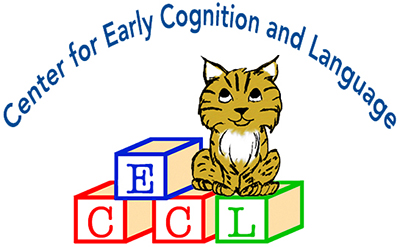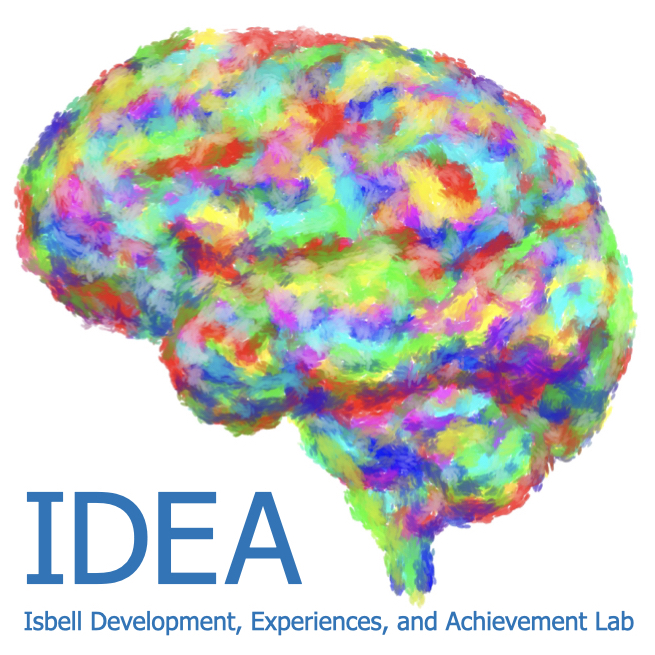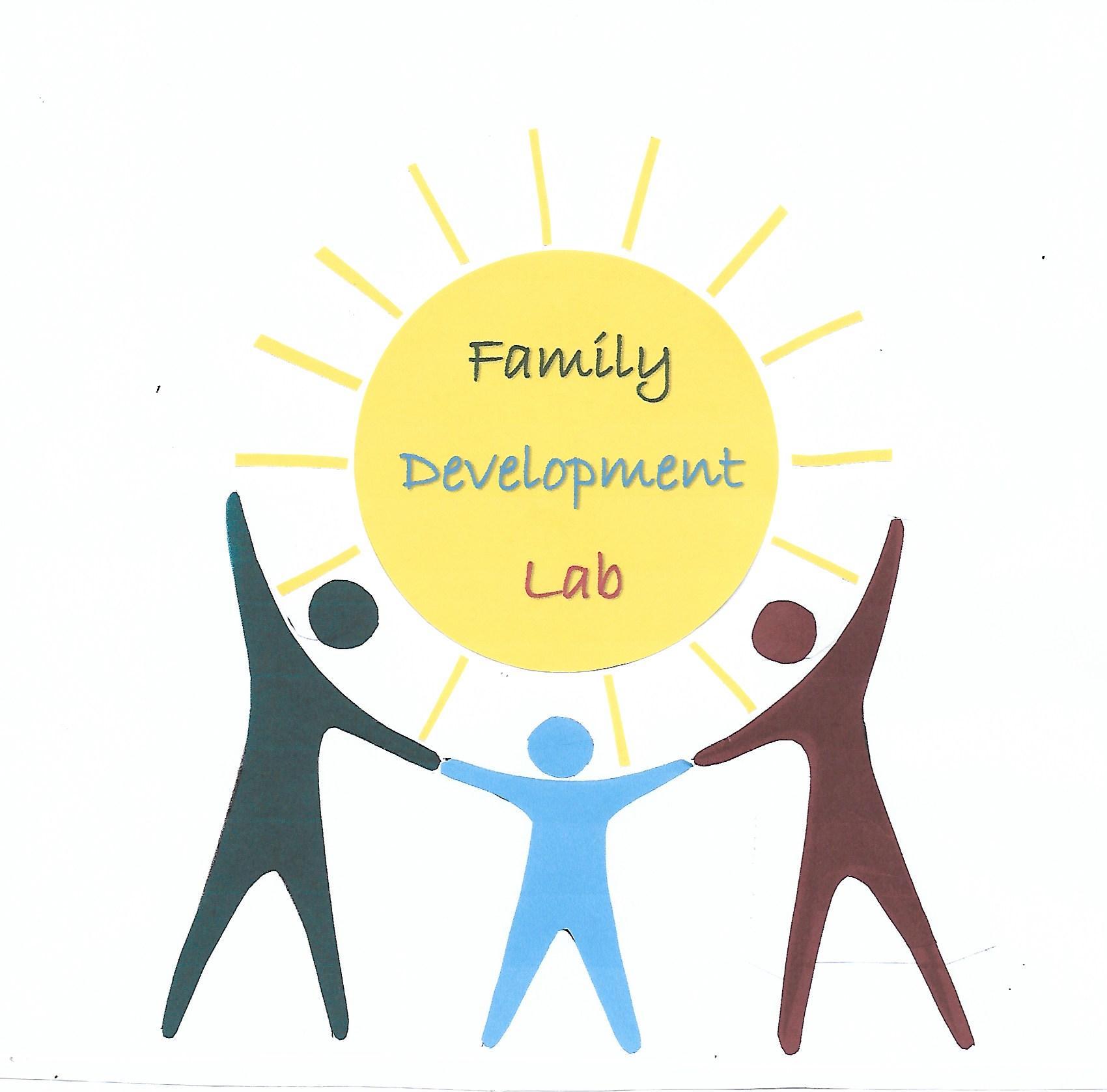Our research investigates important questions about children and their families. We have many different projects going on at any given time. You can learn about some of our current projects below.
Bortfeld Lab
The joint attention project taking place in Dr. Heather Bortfeld’s lab engages parents and children in joint play with a fixed set of toys selected based on the child’s age. Joint attention occurs when two people share interest in an object or event and there is understanding between the two people that they are both interested in the same object or event. For example, a parent and child may both look at a toy they’re playing with. Their mutual interest in the toy may involve them using eye contact, gestures, or speech to get “on the same page” about what they are looking at. These skills start to develop soon after birth, and by the age of three, children are usually competent at gaining and maintaining joint attention from adults and peers. We are interested in documenting how this process unfolds in real time between a parent and their child.
Center for Early Cognition and Language
 Trust is essential for everyday social interactions and relationships. Trust is also important to many aspects of child development because children need to decide who they can trust to teach them new information (i.e. epistemic trust) and who they can trust for social support and to keep their promises (i.e. social trust). In an ongoing project led by Dr. Rose Scott and funded by the National Science Foundation, we are investigating how epistemic and social trust develops in early childhood, and whether children consider different factors when making these two types of trust judgments. We are also investigating whether children's decisions of who to trust are influenced by social categories (e.g., race, ethnicity) or children's environments.
Trust is essential for everyday social interactions and relationships. Trust is also important to many aspects of child development because children need to decide who they can trust to teach them new information (i.e. epistemic trust) and who they can trust for social support and to keep their promises (i.e. social trust). In an ongoing project led by Dr. Rose Scott and funded by the National Science Foundation, we are investigating how epistemic and social trust develops in early childhood, and whether children consider different factors when making these two types of trust judgments. We are also investigating whether children's decisions of who to trust are influenced by social categories (e.g., race, ethnicity) or children's environments.
Family Development Lab
The Family Development Lab at UC Merced investigates how parent-child dynamics are shaped by culture and context. Dr. Alexandra Main and her team focus on how the timing of parent and child behaviors influences relationship processes (e.g., disclosure, conflict management) and mental health and behavioral adjustment (e.g., internalizing and externalizing problems, prosocial behavior). Our current projects include a home-visiting study with the Merced County Office of Education examining parenting, mental health, and child adjustment, as well as a large multi-institutional study of how parent-adolescent dynamics relate to adolescents’ and young adults’ social and emotional development using both online and in-person methods. We also collaborate with local hospitals on studies of parent-adolescent dynamics in the context of type 1 diabetes management.
IDEA Lab
 When we are talking to a friend in a coffee shop, how do we pay attention to what our friend is saying while ignoring all the other conversations happening around us? How do our brains detect regularities in sounds and speech, even when we are not paying attention? How do these fundamental skills that allow children to listen, pay attention, and learn develop? This project led by Dr. Elif Isbell focuses on the development of brain functions that support our abilities to attend to relevant sounds, ignore irrelevant sounds, and detect regularities in our soundscapes. In this project, we are using electroencephalogram (EEG), a noninvasive technique used to study brain responses. This method allows us to gain a better understanding of how diverse environmental experiences contribute to the development of foundational brain functions.
When we are talking to a friend in a coffee shop, how do we pay attention to what our friend is saying while ignoring all the other conversations happening around us? How do our brains detect regularities in sounds and speech, even when we are not paying attention? How do these fundamental skills that allow children to listen, pay attention, and learn develop? This project led by Dr. Elif Isbell focuses on the development of brain functions that support our abilities to attend to relevant sounds, ignore irrelevant sounds, and detect regularities in our soundscapes. In this project, we are using electroencephalogram (EEG), a noninvasive technique used to study brain responses. This method allows us to gain a better understanding of how diverse environmental experiences contribute to the development of foundational brain functions.
IMPACT Lab
 The IMPACT Lab at UC Merced, directed by Dr. Bámaca, is currently working to launch the MALE Project (Male Adjustment in Learning Settings) focused on the experiences of college male students attending UC Merced. UC Merced is a unique context for studying student adaptation given that many students here are first generation college students (meaning, first in their family pursuing a college degree). The focus of this project is to shed light on the multiple factors within family, peer, school, and work contexts that contribute to the mental health and academic achievement of Males attending a 4-year college. We focus on self-identified Males for this project given that research on college success indicates that in recent years males are lagging in college graduation rates (as compared to females). Further, most research on college students does not generally pay attention to the unique experiences that males in college may face in part due to masculine cultural and societal expectations of being “strong” and the discouragement of expressing emotions. This can lead males to engage in behavioral coping strategies such as substance use and suffering from mental health problems for which they may not seek professional help. We will also examine what factors from family, peers, school, and work contribute to better psychological and academic adjustment.
The IMPACT Lab at UC Merced, directed by Dr. Bámaca, is currently working to launch the MALE Project (Male Adjustment in Learning Settings) focused on the experiences of college male students attending UC Merced. UC Merced is a unique context for studying student adaptation given that many students here are first generation college students (meaning, first in their family pursuing a college degree). The focus of this project is to shed light on the multiple factors within family, peer, school, and work contexts that contribute to the mental health and academic achievement of Males attending a 4-year college. We focus on self-identified Males for this project given that research on college success indicates that in recent years males are lagging in college graduation rates (as compared to females). Further, most research on college students does not generally pay attention to the unique experiences that males in college may face in part due to masculine cultural and societal expectations of being “strong” and the discouragement of expressing emotions. This can lead males to engage in behavioral coping strategies such as substance use and suffering from mental health problems for which they may not seek professional help. We will also examine what factors from family, peers, school, and work contribute to better psychological and academic adjustment.
Interpersonal Development Lab
 One of the current projects in Dr. Eric Walle's lab examines emotion brokering. Across cultures, there are differences in when and how people express emotions. Emotion brokering refers to how people help others navigate these differences. For example, a child from a Latinx household may help their parent understand emotion expression norms in the U.S. This project includes investigating the process of brokering novel emotion norms in young children, as well as examining the impact of emotion brokering on mental health and well-being in young adults. One way to understand someone's thoughts and beliefs of emotions is by examining how they attend to and describe emotional situations. Another project in Dr. Walle's lab is examining how college students and parent-child pairs talk about various emotions. Participants for this research study complete activities such as describing images in a picture book or that are displayed on a computer screen.
One of the current projects in Dr. Eric Walle's lab examines emotion brokering. Across cultures, there are differences in when and how people express emotions. Emotion brokering refers to how people help others navigate these differences. For example, a child from a Latinx household may help their parent understand emotion expression norms in the U.S. This project includes investigating the process of brokering novel emotion norms in young children, as well as examining the impact of emotion brokering on mental health and well-being in young adults. One way to understand someone's thoughts and beliefs of emotions is by examining how they attend to and describe emotional situations. Another project in Dr. Walle's lab is examining how college students and parent-child pairs talk about various emotions. Participants for this research study complete activities such as describing images in a picture book or that are displayed on a computer screen.
LATCH Lab
How does maternal stress influence the composition of human milk? How does a mother’s sleep influence the amount of breast milk that she produces? Jennifer Hahn-Holbrook’s LATCH lab is currently recruiting new mothers for a study to investigate the environmental factors that influence hormones in human milk. For example, we want to know how light exposure and stress influence how breast milk changes over the day. This project involves new mothers wearing sensors that track their light exposure and sleep, mothers completing daily surveys, and providing breast milk samples. This project will help us understand the ways that mothers' environments can influence infant development by changing the composition of mothers' milk.




